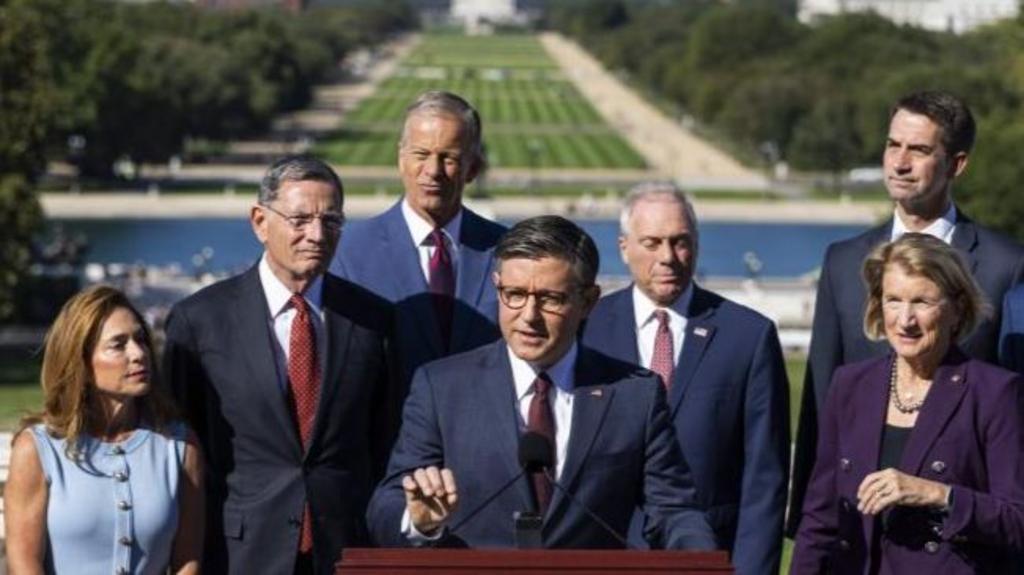The United States government has entered a shutdown, commencing with the failure of the Senate to pass a crucial spending bill on Tuesday evening. This marks the first instance in nearly seven years where federal operations have faced significant curtailment.
Like its predecessors, this shutdown will inevitably conclude. The duration remains uncertain, potentially spanning days or weeks, until mounting public pressure and political repercussions compel a resolution.
Here are four plausible scenarios outlining potential pathways to ending the current government shutdown.
Senate Democrats rejected a Republican-backed spending measure intended to maintain government operations until November. However, this very vote may contain the seeds of their eventual capitulation.
While forty-four Democrats, along with Republican Rand Paul, opposed the bill, two Democrats and one aligned independent legislator sided with the Republican majority.
Independent Senator Angus King of Maine is often a wildcard. John Fetterman of Pennsylvania has followed an independent course for some time. However, Catherine Cortez Masto of Nevada, while not a progressive firebrand, is not typically seen as a political outlier.
Notably, she faces re-election next year in Nevada, a state carried by Donald Trump in 2024 and which has been demonstrating a gradual Republican trend in recent years.
In explaining her vote, Senator Cortez Masto cited concerns about the economic impact of a government shutdown on Nevada. She may also be considering the potential negative consequences for her own re-election prospects as an incumbent facing voters frustrated by the impasse.
She is not alone among Democratic senators from competitive states facing re-election in 2026. Senators from Georgia, Virginia, and Colorado may also begin to feel similar pressures.
Furthermore, while incumbents from Minnesota, Michigan, and New Hampshire have opted to retire rather than seek re-election, they may also be concerned that a prolonged shutdown jeopardizes Democratic control of their respective seats.
Republican Senate Leader John Thune reports hearing from several Democrats expressing unease with the current shutdown. He intends to hold a series of funding votes in the coming days to maintain pressure on the opposition.
Although Wednesday’s vote saw no new defections, the defection of five additional Democrats would effectively end the shutdown, regardless of the broader Democratic Party’s preferences.
Even with relative Democratic unity, the pressure to abandon the fight is likely to intensify as the shutdown continues.
Government employees represent a key Democratic constituency, and they will be among the first to experience the adverse effects of delayed paychecks and the possibility that the Trump administration will leverage the shutdown to further reduce government programs and convert furloughs into permanent job losses.
The broader American public will also feel the consequences through diminished government services and economic disruptions.
Historically, the party initiating a shutdown and making specific policy demands – in this case, the Democrats – often bears the brunt of public criticism. If this pattern holds, the Democratic Party may conclude that it has made its point and opt to minimize further losses.
Even without securing tangible concessions, Democrats might find solace in having highlighted the expiring health insurance subsidies and Republican-approved healthcare cuts for low-income individuals, which are poised to affect millions of Americans in the coming months.
The thinking goes that the ensuing blame game could position them advantageously to reap political benefits.
While the Democratic base, which has urged the party to stand firm against the Trump administration, may not be entirely satisfied, this scenario presents a potential off-ramp that party leadership might find acceptable.
Currently, Republicans believe they are in a position of strength and are considering strategies to amplify pressure on Democrats. However, they risk miscalculation and potentially becoming the party to ultimately concede.
Given their history of involvement in previous government shutdowns, the public may once again hold them accountable. This could stem from habit or from Republicans overplaying their hand in their zeal to curtail government services and reduce the workforce.
In this scenario, Republicans would offer Democrats some credible assurance of supporting the extension of health insurance subsidies.
This outcome is not entirely implausible, considering the existing divisions among Republicans regarding the continuation of these subsidies, which benefit their own low-income constituents. Such a concession could ultimately bolster their own electoral prospects and preempt potential Democratic attacks in next year’s midterm elections.
While Republicans have stated they will not negotiate with those employing “political hostage-taking,” a compromise might be attainable beneath the prevailing heated rhetoric and animosity.
Currently, heated rhetoric and animosity dominate the discourse. President Trump is circulating AI-generated videos targeting his opponents, while Democrats are responding with Trump-Epstein imagery and vows of long-term resistance.
The previous government shutdown set a record of 35 days, ending only after significant disruptions to U.S. air travel loomed. Even then, it was a partial shutdown, with some government funding approved. The consequences this time could be even more severe.
If this impasse persists, the ultimate “winner” may be irrelevant, as widespread blame will likely be assigned.
In this “pox on both houses” scenario, incumbents from both parties face repercussions at the ballot box next year, and public dissatisfaction with the state of affairs intensifies. This sets the stage for a new wave of politicians promising to dismantle the status quo.
And the cycle continues.
Trump sought to remove Cook from the central bank’s board in August, the first time a president has tried to fire a Fed governor.
No one was injured and no apartments were damaged, although some residents were evacuated.
In other countries, governments keep functioning through wars and crises – so what makes America unique?
Investigators will look at the writer’s 2005 death, which was ruled a suicide, at the family’s request despite no new evidence of foul play.
The New York Fire Department tells the BBC that operations are ongoing and no injuries have been reported.

